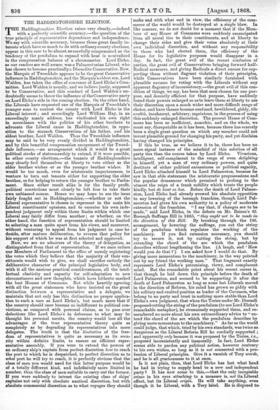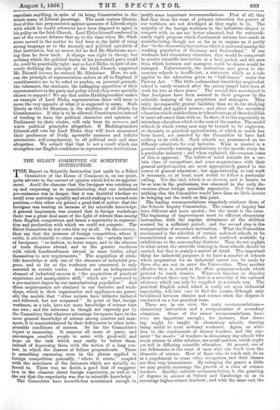THE HADDINGTONSHIRE ELECTION.
Tat Haddingtonshire Election raises very clearly,—indeed with a perfectly scientific accuracy,—the question of the true principle of representative dependence and independence. We say with scientific accuracy, because those great family in- terests which have so much to do with ordinary county elections, appear in this case to be almost ascarefully compensated as the tendency of the pendulum to expand with heat is neutralized in the compensation balance of a chronometer. Lord Elcho, as our readers are well aware, was a Palmerstonian Liberal, who has chosen to become practically a Disraelite Conservative. Now, the Marquis of Tweeddale appears to be the great Conservative influence in Haddingtonshire, and the Marquis's eldest son, Lord Walden, has taken the office of convener of Lord Elcho's Com- mittee. Lord Walden is usually, and we believe justly, supposed to be Conservative, and this conduct of Lord Walden's un- doubtedly seems to throw the influence of the Conservative party on Lord Ekho's side in the coming election. On the other hand, the Liberals have requested one of the Marquis of Tweeddale's younger sons to contest the county with Lord Elcho in the Liberal interest ; and accordingly Lord William Hay, in an exceedingly manly address, has vindicated his own right in accordance with the politics of his other brothers to advocate the Liberal cause in Haddingtonshire, in oppo- sition to the staunch Conservatism of his father, and his eldest brother, Lord Walden. Thus the Tweeddale influence may be said to be very evenly divided in Haddingtonshire, and by this beautiful compensation escapement of the Tweed- dale influence,—an arrangement which it wo'uld be a great political stroke of statesmanship to extend, if it were possible, to other county elections,—the tenants of Haddingtonshire may clearly feel themselves at liberty to vote either as the elder brother wishes or as the younger brother wishes. It would be too much, even for aristocratic imperiousness, to venture to turn out tenants either for supporting the elder brother, or for helping to return the younger brother to Parlia- ment. Since either result alike is for the family profit, political convictions must clearly be left free to take their own unbiassed course. Hence we may hope to see the issue fairly fought out in Haddingtonshire,—whether or not the Liberal representative is chosen to represent in the main his Liberal constituents' opinions, and to exercise his own inde- pendent judgment only within those limits within which one Liberal may fairly differ from another ; or whether, on the other hand, the function of representation should be limited to selecting a man quite apart from his views, and moreover, without venturing to appeal from his judgment in case he decide, after mature deliberation, to reverse that policy for his support of which he was at first selected and approved.
Now, we are no admirers of the theory of delegation, as distinguished from that of representation. If we once reduce our Members of Parliament to the office of merely registering the votes Which they believe that the majority of their con- stituents would wish to give, we shall sacrifice entirely the deliberative character of the principal legislative body, and with it all the anxious practical considerateness, all the intel- lectual elasticity and capacity for self-adaptation to new circumstances and new thoughts, which have hitherto marked the best Houses of Commons. But while heartily agreeing with all the great statesmen who have insisted on the great distinction between a representative and a delegate, we maintain that not only has this distinction no proper applica- tion to such a case as Lord Elcho's, but much more that if the country should once become so indifferent to political con- victions, as compared with personal claims, as to pass over defections like Lord Elcho's in deference to what may be thought his personal merits, the country would lose all the advantages of the true representative theory quite as completely as by degrading its representatives into mere delegates. The truth is that the limitation of the free- dom of representatives is quite as necessary as its secu- rity within definite limits, to ensure an efficient repre- sentative assembly. If you were to extend the powers of an ordinary ship's captain from perfect discretion how to reach the port to which he is despatched, to perfect discretion as to what port he will try to reach, it is perfectly obvious that the class of men you would need for this latter purpose would be of a totally different kind, and indefinitely more limited in number, than the class of men suitable to carry out the former. If you were suddenly to intrust the existing class of ships' captains not only with absolute nautical discretion, but with absolute commercial discretion as to what voyages they should make and with what end in view, the efficiency of the com- merce of the world would be destroyed at a single blow. In
like manner, we do not doubt for a moment that if the Mem-
bers of any House of Commons were suddenly emancipate& from all moral ties to their constituents, and at liberty to.
change their sides and give their votes absolutely at their- own individual discretion, and without any responsibility- to those who had elected them, the efficiency of the-
House for its legislative purposes would disappear in a. day. In fact, the great evil of the recent confusion of parties, the great evil of Conservatives bringing forward half- Radical measures, and giving Radicals a direct excuse for sup- porting them without flagrant violation of their principles, while Conservatives have been similarly furnished with, plausible excuses for voting with the Liberals without any apparent flagrancy of inconsistency,—the great evil of this con- dition of things, we say, has been that men chosen for one pur- pose, and decently efficient for that purpose, have suddenly found their powers enlarged so as-to leave them at liberty to use- their discretion upon a much wider and more difficult range of choice, and have thence become confused, bewildered, giddy, tete- esalte'e, incoherent, arbitrary, capricious, in the process of using- this suddenly enlarged discretion. The present House of Com- mons has been so inefficient, anarchic, and on the whole, we- must say, disreputable as it has been, because there has scarcely been a single great question on which any member could not- invent plausible ground for changing his party, and yet disclaim having changed his principles.
If this be true, as we believe it to be, there has been no more signal instance of the mischief of this solution of all party ties than the course taken by Lord Elcho. Vivacious, intelligent, self-complacent to the verge of even delighting-- in himself, yet a man of very ordinary powers, and quite destitute of either political earnestness or political sagacity,
Lord Elcho attached himself to Lord Palmerston, because he saw in that able statesman the aristocratic prepossessions and the popular demeanour which promised to prolong to the- utmost the reign of a frank nobility which treats the people
kindly, but de haut en bas. Before the death of Lord Palmer- ston, Lord Elcho had already avowed his absolute opposition
to any lowering of the borough franchise, though Lord Pal- merston had given his own authority to a policy of moderate- extension of the franchise. "I say that, if changes are to be
made," said Lord Elcho, in the debate on Mr. Baines's 6/. Borough Suffrage Bill in 1865, "they ought not to be made in the direction of this Bill. By breaking through the 10/. arrangement, by lowering the suffrage, you cut the string of the pendulum which regulates the working of the- machinery. If you find extension necessary, you should, try to secure it, not by cutting the string, but by-
extending the chord of the arc which the pendulum describes without lengthening the line. (A laugh, and How would you do that I') I am asked how I would do that. By- giving more momentum to the machinery, in the way pointed out by my friend the working man." That fragment exactly represents Lord Pdcho's patronizing, viewy, and complacent mind. But the remarkable point about his recent career is, that though he laid down this principle before the death o1 Lord Palmerston, and seemed to be supporting it after the- death of Lord Palmerston so long as none but Liberals moved in the direction of Reform, his mind has grown so giddy with his solitary and exalted position as leader of the Cavemen, who- belong to no party and trust in nothing more stable than Lord Elcho's own judgment, that when the Tories under Mr. Disraeli proposed cutting the string of the pendulum (to use Lord Elcho's-
remarkable metaphor), he strenuously supported them, and re- membered no more about his own extraordinary advice to "ex-- tend the chord of the arc which the pendulum describes by giving more momentum to the machinery." As far as the world could judge, that which, tried by his own standards, was twice as. dangerous as the Liberal Reform Bill he cordially supported ; and apparently only because it was proposed by the Tories, i.e., proposed inconsistently and immorally. In fact, Lord Elcho, seems able to pardon any political action, however contrary to his own wishes, so long as it is not connected with a pro- fession of Liberal principles. Give it a varnish of Tory words, and he is all graciousness to it at once. Is -it not plain, then, that Lord Elcho has lost what head he had in trying to supply head to a new and independent party ? It has now come to this,—that the only inexpiable- crime in his eyes attaching to a measure is, not its. Liberal effect, but its Liberal origin. He -will take anything, even though it be Liberal, with a Tory label. He is disposed to, repudiate anything, in spite of its being Conservative in the truest sense, of Liberal parentage. The most curious illustra- tion of this last prepossession against measures of Liberal origin with which he would otherwise have been disposed to agree, is his policy on the Irish Church. Lord Elcho himself confessed in one of the recent debates that up to the time when Mr. Glad- stone moved in the matter he had been in the habit of using strong language as to the anomaly and political mischiefs of that institution, but no sooner did he find Mr. Gladstone mov- ing than he drew back. A change was right in theory, but nothing which the political leader of his (nominal) party could do, could be practically right; and so Lord Elcho, in spite of sin- cerely disliking the principle of the Irish Church, supported Mr. Disraeli because he resisted Mr. Gladstone. How, we ask, can the principle of representation endure at all in England, if constituencies are to be asked to pardon, on personal grounds, the vehement, the obstinate, the unflagging opposition of their representatives to the party and policy which they were specially chosen to support ? We say that unless Haddingtonshire makes an example of Lord Elcho, representation there will seem to mean the very opposite of what it is supposed to mean. Such liberty as this for Members, is the abolition of all liberty for Constituencies. If this is to be allowed, Constituencies instead of tending to form the political character and opinions of Parliament by their choice, will only form its manners, and waive political principles altogether. If Haddingtonshire Liberals still vote for Lord Elcho, they will have announced their preference of lively, agreeable manners and infinite aristocratic self-complacency, to all political ends and aims altogether. We submit that that is not a result which can strengthen our English confidence in representative institutions.































 Previous page
Previous page